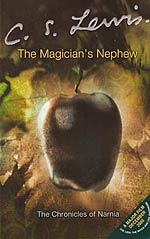
![]() digitaltempest
digitaltempest
12/19/2013
![]()
The Lion, The Witch, and the Wardrobe has for, quite some time, been a movie that I've enjoyed, and I've enjoyed in just about every incarnation of it. I first remember seeing the movie as a young girl on PBS. I had to be around 6 or 7 at the time, and I was completely enamored with the movie. Now, at that time, I was also already a pretty avid reader, but it wasn't until some years later that I realized that movie was based on a book--a book that was part of a series. You'd think as much as I love the movie(s) that I would've started reading the books well before now, and honestly, I did have all intentions of reading the series before becoming a grown woman with two children of my own. However, it didn't quite work out that way. Better late than never, though, right?
I'm reading these books chronologically, even though this book and one other book in the series came a little later than some of the other books in the series. Luckily, Goodreads does have an option to see these books in chronological order, which is a very good thing because I wasn't even aware there was technically a book before The Lion, The Witch, and the Wardrobe. And I guess I could've started there and read them in their publishing order since the other two books only really add a little history to the story, but I'm glad that I started it reading it like this.
Up to this point, the only thing I'd read by Lewis was The Screwtape Letters, which I did enjoy for its humorous way of dealing with Christianity, even though I know there was a stern message about being one of those self-righteous Christians whose "concerns" for other really point to a selfishness in their own hearts, who twist religion to better fall in line with their personal biases. I also like that the story came from the POV of the demon and not the sanctified.
This book chronicles the creation of Narnia and its first inhabitants including how the White Witch came to be and the creation of the wardrobe. The creation of Narnia in many ways parallels the creation as written in the bible right down to having a tree of life and a Adam (Digory) and Eve (Polly). Aslan even sang/spoke things into existence. However, Lewis added a creative flair to the old story and made it a really beautiful read as he described Narnia being born from nothing. I love stories that mark the creation of a new world. I enjoy seeing how different writers think a new world and its inhabitants would be created whether it's from chaos or being called into being.
The queen was an evil accidentally introduced into Narnia during its creation, and I would've liked more backstory on the queen. We're given just enough of her history to know what she was capable of and the hubris she dressed in, just enough to make her terrifying in the way that evil witch queens, such as Maleficent, are. She came from a dying world where she'd used the "deplorable word" rather than to lose to her sister, but we don't know exactly what started this fight or if the sister was more evil than Jadis or if she were good. We only get to learn about how little regard Jadis has for life and how she would rather burn a world to the ground than give up her power.
She's in a state of stasis when the children find her in her world, and she eventually ends up following them back to present day England and on to Narnia. As her world went to nothing, Narnia came from nothing. However, her magic wasn't strong in Narnia, not like it'd been in her homeworld, at this point. So, she's forced to bide her time, and Aslan takes precautions to protect Narnia from her influence, though he knows a battle will come.
This was a very quick read. The story is easy to get caught up in. I joked that the title of this book should've been Uncle Andrew, No because his playing at magic, with disregard to anyone but himself, is what opened up this new world to Digory and Polly. Which brings to one thing I noticed about the story. Maybe it's just the way the book is written, since it is a young adult/children's book (and I am an adult), but there was just something a little too plain cut about this story. There's not much room for gray. Things are just inexplicably good or evil without much reason why. They just are.
For sure, this book suggests that even "bad" characters aren't beyond redemption, but it just feels more like they're "bad" because they just don't know any better or they don't know any other way to be, not because they have decided it's better to be "evil" than "good." And I'm bit surprised how much more complex these issues seem in the movies when compared to this book. Now, I know I am extremely early and should hold my judgment because I may end up having to eat crow for that statement.
I think this book has something to say about creativity and imagination, and how we can stifle ourselves by not believing in the magic of such things as shown through Uncle Andrew who denied the magic even though he felt it. In the end, he was unable to appreciate the true beauty of Narnia. We purposely silence the creative side of us in favor of being "practical" when those things are very important to who we are and how we view life.
http://bibliosanctum.blogspot.com/2013/02/the-magicians-nephew-by-cs-lewis.html